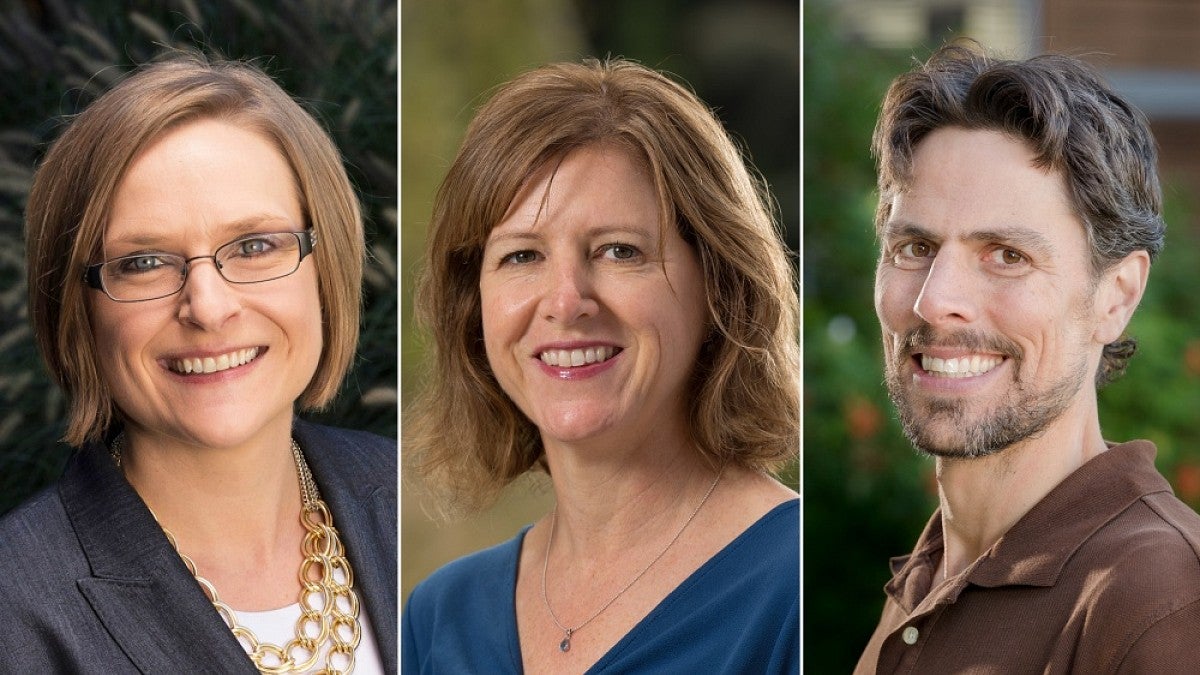Two University of Oregon faculty members received awards from the Society for Prevention Research at the group’s annual meeting on May 31. The international organization is focused on research examining the causes and prevention of social, physical and mental health and academic problems.
Emily Tanner-Smith received the Nan Tobler Award, which recognizes stellar articulation of empirical evidence. Mark Van Ryzin was selected for the Early Career Preventionist Network John B. Reid Early Career Award, which highlights exceptional prevention research contributions.
“These awards demonstrate that the UO is a leader in the field of prevention science research,” said David Conover, vice president for research and innovation. “We congratulate professors Tanner-Smith and Van Ryzin on these well-deserved awards.”
The Nan Tobler Award is given to individuals or research teams “for contributions to the summarization or articulation of the empirical evidence relevant to prevention science.” Tanner-Smith, who is an associate professor in both the Department of Counseling Psychology and Human Services and the Department of Educational Methodology, Policy and Leadership, received the award for her work in meta-analysis and systematic reviews. Tanner-Smith is the first woman to receive the award as a sole recipient since 2001.
“Emily has significantly advanced the understanding of what works to prevent substance use and abuse in a range of settings and populations and has had a direct impact on prevention policy, practice and training,” said Leslie Leve, a professor in the Department of Counseling Psychology and Human Services at the UO and the current president of the Society for Prevention Research. “Her ability to excel in a discipline that has been dominated by male scholars is an additional testament to her incredible skills and contributions in data science fields.”
The John B. Reid Early Career Award recognizes “a commitment to prevention science through outstanding contributions to research, policy or practice” and is named for the co-founder of the Oregon Social Learning Center. Van Ryzin, this year’s awardee, is a faculty member in the Department of Educational Methodology, Policy and Leadership.
“This is the first time this award has been bestowed on someone who worked at Oregon Social Learning Center with John B. Reid.” Leve said. “Mark first came to Oregon as a postdoc and has since collaborated with a wide range of some of the most well-known prevention researchers in the field and has made outstanding contributions to prevention science research.”
Founded in 1991, the Society for Prevention Research is dedicated to advancing research and interventions that promote human health and well-being. It is a multi-disciplinary organization that includes scientists, practitioners, advocates, administrators and policy makers in the U.S. and internationally.
Leve, who was elected as president of the organization last year, says supporting early career researchers is critical to the growth and success of prevention research. She had made mentorship and career support the focus of her two-year presidency with the organization.
“I was very honored to be elected by the Society for Prevention Research membership to serve as their president, to help guide the direction of prevention research,” Leve said. “I love that we have such a vibrant group of early career members who are asking new prevention questions, designing new methods and thinking in novel ways about how to prevent some of society’s most costly problems such as drug addiction, depression and school dropout.”
Three UO faculty members serve on the editorial board for the journal Prevention Science — Charles Martinez, Beth Stormshak and Tasia Smith. Multiple faculty members have also received awards from the society since 2010.
- Charles Martinez, Service to the Society for Prevention Research Award, 2016
- Charles Martinez, International Collaborative Prevention Research Award, 2015
- Philip Fisher, Translational Science Award, 2012
- Leslie Leve, Prevention Science Award, 2011
—By Steph Nappa, Office of the Vice President for Research and Innovation


